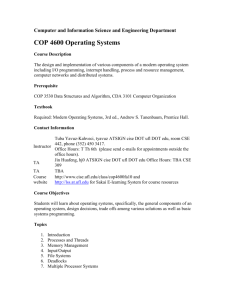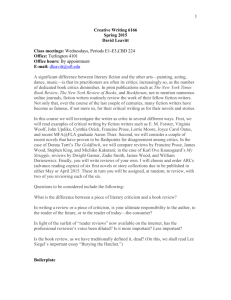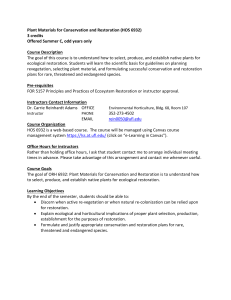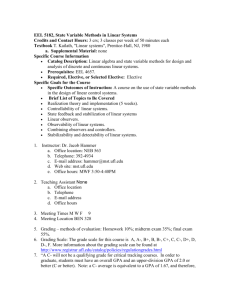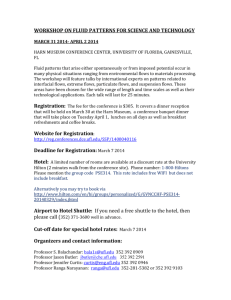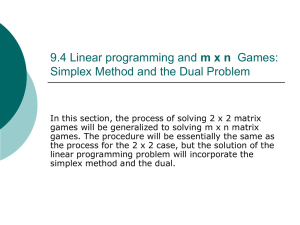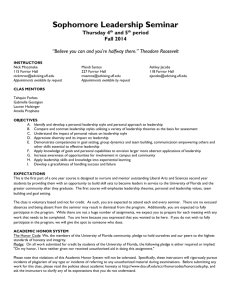ESI 6314 - University of Florida
advertisement
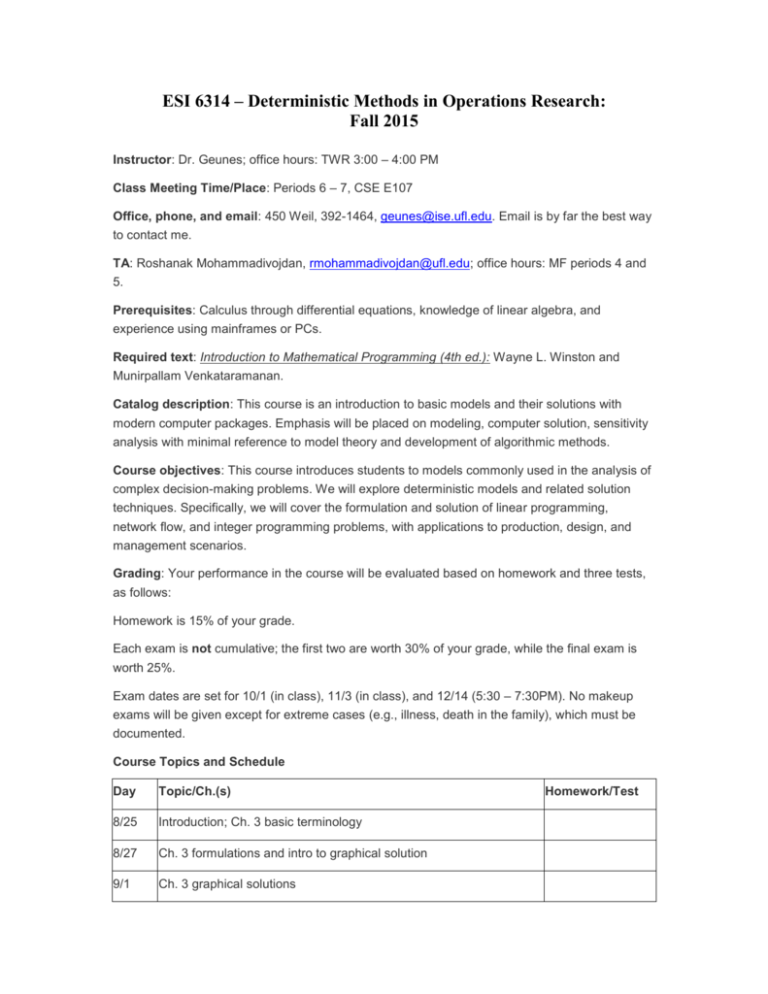
ESI 6314 – Deterministic Methods in Operations Research: Fall 2015 Instructor: Dr. Geunes; office hours: TWR 3:00 – 4:00 PM Class Meeting Time/Place: Periods 6 – 7, CSE E107 Office, phone, and email: 450 Weil, 392-1464, geunes@ise.ufl.edu. Email is by far the best way to contact me. TA: Roshanak Mohammadivojdan, rmohammadivojdan@ufl.edu; office hours: MF periods 4 and 5. Prerequisites: Calculus through differential equations, knowledge of linear algebra, and experience using mainframes or PCs. Required text: Introduction to Mathematical Programming (4th ed.): Wayne L. Winston and Munirpallam Venkataramanan. Catalog description: This course is an introduction to basic models and their solutions with modern computer packages. Emphasis will be placed on modeling, computer solution, sensitivity analysis with minimal reference to model theory and development of algorithmic methods. Course objectives: This course introduces students to models commonly used in the analysis of complex decision-making problems. We will explore deterministic models and related solution techniques. Specifically, we will cover the formulation and solution of linear programming, network flow, and integer programming problems, with applications to production, design, and management scenarios. Grading: Your performance in the course will be evaluated based on homework and three tests, as follows: Homework is 15% of your grade. Each exam is not cumulative; the first two are worth 30% of your grade, while the final exam is worth 25%. Exam dates are set for 10/1 (in class), 11/3 (in class), and 12/14 (5:30 – 7:30PM). No makeup exams will be given except for extreme cases (e.g., illness, death in the family), which must be documented. Course Topics and Schedule Day Topic/Ch.(s) 8/25 Introduction; Ch. 3 basic terminology 8/27 Ch. 3 formulations and intro to graphical solution 9/1 Ch. 3 graphical solutions Homework/Test 9/3 Ch. 2: Review of linear algebra 9/8 Ch. 4: Standard form, basic feasible solutions, unbounded directions, optimality of basic feasible solutions 9/10 Ch. 4: Simplex algorithm 9/15 Ch. 4: Simplex algorithm, alternative optimal solutions, unbounded LPs, degeneracy, the big-M method, two-phase method 9/17 Ch. 4: Finish simplex algorithm, introduction to solvers 9/22 Using LINDO and MS Excel Solver 9/24 Ch. 6: Graphical sensitivity analysis, the idea of a shadow price, sensitivity analysis in the simplex tableau 9/29 Review for Test 1 10/1 Homework 1 Due Test 1 10/6 Ch. 6: The dual of an LP 10/8 Ch. 6: Economic interpretation of the dual, the dual theorem, formal definition of shadow prices 10/13 Ch. 6: Complementary slackness 10/15 Interpretation of solver output 10/20 Ch. 7: Transportation problems, finding basic feasible solutions, and the transportation simplex 10/22 Ch. 7: Transportation problems, assignment problems, the Hungarian method 10/27 Ch. 8: Shortest path problems, Dijkstra’s algorithm 10/29 Review for Test 2 11/3 Homework 2 Due Homework 3 Due Homework 4 Due Test 2 11/5 Ch. 8: Maximum Flow problems, the Ford-Fulkerson method 11/10 Ch. 8: CPM and PERT 11/12 Ch. 8: Introduction to min-cost network flow problems 11/17 Ch. 8: min-cost network flow problems, minimum spanning tree problem Homework 5 Due 11/19 Ch. 8: Network simplex method 11/24 Ch. 9: Formulating integer programming problems 12/1 Ch. 9: Using Excel to solve integer programs, basic ideas behind branch and bound method 12/3 Ch. 12: Nonlinear programming 12/8 Review for final exam Homework 6 Due Homework 7 Due Final Exam 12/14 (5:30 – 7:30 PM) Policies: 1) Attendance is very strongly encouraged. Please do not try to rely solely on the book if you miss class, since I sometimes teach items not covered in the book. If you miss class, obtain and review the notes that you missed from someone before coming to the next class. 2) Homeworks must never be copied. You may certainly ask others for conceptual advice on problems, but copying homework or turning in homework answers that you do not completely understand is strictly prohibited, and will result in a grade of zero for the assignment. 3) Homeworks are due at the beginning of class on the assigned day. (I reserve the right to give a minute or two grace, but coming to class 5-10 minutes late does not count as “on-time.”) Turning it in late is a 15% penalty per day, including weekends, and the first “day” defined as after class on the due date. For example, suppose an assignment is due on a Friday. Turning it in after class begins on Friday is a 15% penalty, submitting it on Saturday is a 30% penalty, the next day is 45%, and so on. There will be occasions where late homeworks will not be permitted at all; these cases will be clearly marked. 4) If you disagree with a grade that you have received, please do the following: write or type your complaint, and briefly state why you feel you should have received more points. (If we have added up your points wrong, there’s no need to do this; just give it to me and tell me what happened.) We will not “regrade the whole assignment” or look for reasons to discourage you from doing this. If we messed up your assignment, you should not feel like you should have to gamble as to whether or not you should bring it up to us. Academic dishonesty: All students admitted to the University of Florida have signed a statement of academic honesty committing themselves to be honest in all academic work and understanding that failure to comply with this commitment will result in disciplinary action. This statement is a reminder to uphold your obligation as a University of Florida student and to be honest in all work submitted and exams taken in this course. If you conduct any dishonest act (e.g., cheating on an exam, bringing in extra material not allowed during the exams, or copying someone else’s homework), you will get a credit of 0 on that assignment/exam. Further action is possible depending on the severity and repetition of cheating. Software use: All faculty, staff, and students of the University of Florida are required and expected to obey the laws and legal agreements governing software use. Failure to do so can lead to monetary damages and/or criminal penalties for the individual violator. Because such violations are also against University policies and rules, disciplinary action will be taken as appropriate. We, the members of the University of Florida community, pledge to uphold ourselves and our peers to the highest standards of integrity. Course Evaluations: Students are expected to provide feedback on the quality of instruction in this course by completing online evaluations at https://evaluations.ufl.edu . Evaluations are typically open during the last two or three weeks of the semester, but students will be given specific times when they are open. Summary results of these assessments are available to students at https://evaluations.ufl.edu/results/. Accommodation for students with disabilities: Students with disabilities requesting accommodations should first register with the Disability Resource Center (352-392-8565, www.dso.ufl.edu/drc/) by providing appropriate documentation. Once registered, students will receive an accommodation letter which must be presented to the instructor when requesting accommodation. Students with disabilities should follow this procedure as early as possible in the semester. UF counseling services: Resources are available on-campus for students having personal problems or lacking clear career and academic goals. The resources include: University Counseling Center: 301 Peabody Hall, 392-1575, Personal and Career Counseling. SHCC Mental Health, Student Health Care Center, 392-1171, Personal Counseling. Center for Sexual Assault/Abuse Recovery Education (CARE), Student Health Care Center, 392-1161, Sexual Assault Counseling.
